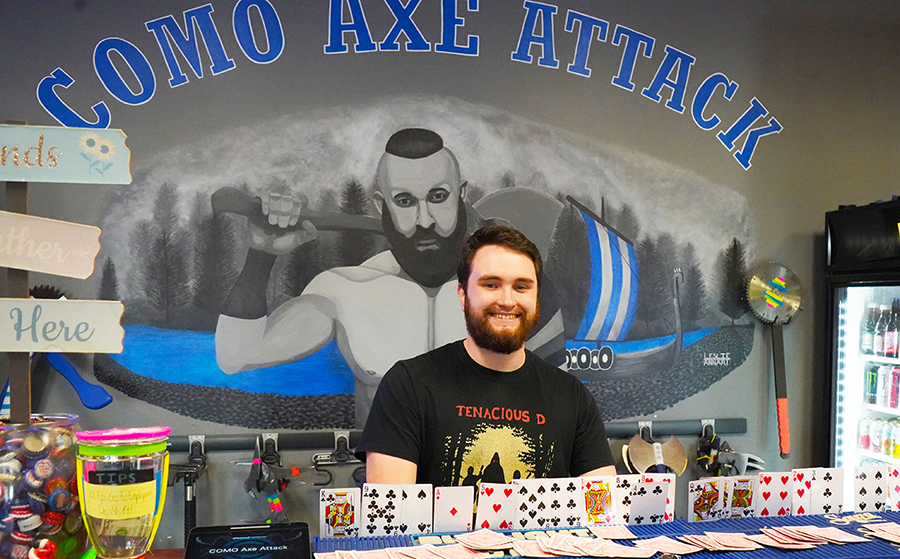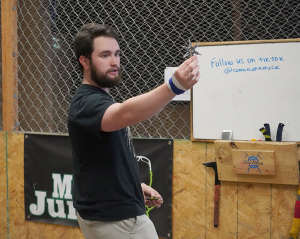
It’s cheaper than therapy, right?
James Long found himself using that phrase often when he first began working at COMO Axe Attack, an axe throwing and smash rage room venue in Columbia. Customers would come in, smash a variety of objects and Long would joke around with them afterward that expressing their stress in the rage room with a baseball bat had to be more affordable than therapy.
After repeating the phrase for what seemed like the hundredth time, Long, who is now a manager at COMO Axe Attack, started to think about the question a little bit deeper. That exploration served as the thesis for an incredibly unique research opportunity.
“People sing the praises of our rage room constantly,” said Long, a psychology major at the University of Missouri. “As I thought more and more about that therapy phrase, I started to think about how I could actually study this type of expression. With help from a few graduate students, I was able to form a project focused on studying which is better for an individual’s mental well-being – expressing aggression in a violent manner or a non-violent manner. A violent manner would be using the rage room, for example. A non-violent option would be participating in a writing exercise.”
Research wasn’t originally part of Long’s plan as an undergraduate student. As he was exploring potential opportunities within psychology the summer between his sophomore and junior year, he found drama therapy, which uses acting and theater to achieve therapeutic goals. With an extensive background in theater, Long said he really connected with the approach.
“Drama therapy combines so much that I’m passionate about,” said Long, who will be a senior this fall. “It’s not super common as an area of study in the United States, though. There are only a handful of universities here that offer drama therapy as a master’s degree. When I talked to one of my professors about potentially pursuing one of those degrees, she suggested that I get involved in research.”
While Long thought he was too late in his college career to begin to take a research route, he quickly searched for psychology laboratories at Mizzou. He was soon connected with the Personality Dynamics Lab, led by Laura King, Curators’ Distinguished Professor in the Department of Psychological Sciences. Long is working directly with Megan Edwards, a graduate student in the lab, on his project.
“The psychology degree program has given me so many unique opportunities,” Long said. “I didn’t fully know what I wanted to do with this degree, but the faculty and staff have helped guide me in so many ways.”
Long will be conducting his study throughout the summer after securing extra funding through the Cherng Summer Scholars program. A full-time, nine-week summer research or creative scholarship program for Honors College students, the Cherng Summer Scholars program is supported by a gift from Peggy and Andrew Cherng and the Panda Charitable Foundation. Recipients receive a $7,000 award and access to a $1,000 project expense account.
“I was actually in Mort’s when I opened the email that I had received the funding,” Long said. “I was beyond surprised. I was so excited, in fact, that I didn’t do so great on a psychology exam I had right after lunch. All I could focus on was being able to support my research.

“It’s an awesome program, and I’m very thankful that I get to be a part of it.”
Long said that rage rooms, also called smash rooms or anger rooms, are a fairly new concept. Some of the earliest rooms opened in Japan around 2008.
“It’s been really interesting for me to dive deeper into this subject,” Long said. “While the concept of breaking stuff to relieve stress isn’t new, offering an actual room to do it in is an idea that came to be more recently.”
Long has seen how powerful the experience can be firsthand. Participants of the rage room at COMO Axe Attack are allowed to write messages on the wall during their excursion. While some use the room to have a bit of fun, others use it for more therapeutic reasons.
“I’ve seen and read some truly remarkable things,” Long said. “I’ll read the walls at the end of the day, and I see so many messages – cancer sucks, miscarriages suck, heroin sucks. I’ve seen people come out of the room sobbing. It can be a powerful experience. And to know that they were able to work through that in this room is amazing to think about.”
Long added that he has only been able to find a handful of articles tied to rage rooms and their effect on participants. He is actively looking for participants for his study, which will involve a survey – plus an opportunity to break a few things.
“There’s definitely not a lot of research out there, which is why I’m really excited to conduct this type of study,” Long said. “I love working at COMO Axe Attack, so having the opportunity to combine my job with my research is really great. I’m thankful to the owners, too, who are letting me run with this idea.”
Long, who is from Kansas City, Missouri, said the psychology degree program was an easy choice once he made the decision to attend Mizzou. He is an advocate for mental health and is passionate about individuals getting the proper help that they need.
“I had experiences in my life where I found being able to talk to someone outside of my immediate circle was powerful,” Long said. “It helped me so much. I soon realized that it was something I wanted to be able to give back to people, too. I looked at it as a way to pay it forward for all the help I received.”
Drama therapy is where Long is hoping to make his biggest contribution in the world of psychology. He is planning on applying for a Fulbright study grant opportunity with the goal of earning a master’s degree in drama therapy overseas. Long would then like to return to the US for a psychology PhD and eventually become a professor.
“Like art therapy and music therapy, drama therapy is the next iteration of using a craft to work through problems and achieve goals,” Long said. “While it has been around for a little bit, it hasn’t caught on as much in the United States. I want to bring that opportunity to students, especially at the undergraduate level. I’m passionate about bringing in a new wave of drama therapy.”